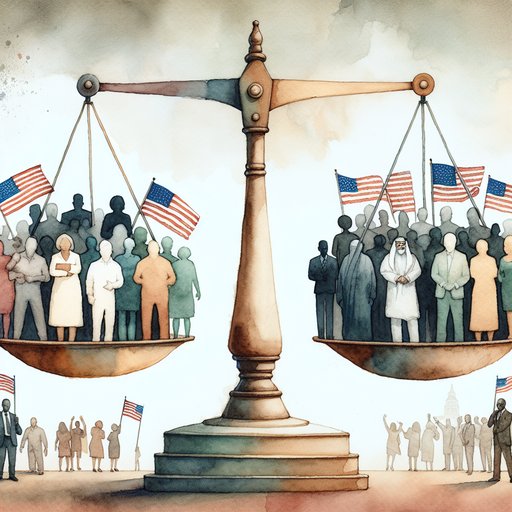
As the dust settles on recent legislative battles in the United States, the razor-thin margins of victory seen in Congress highlight a crucial tension in democratic governance: the delicate balance between procedural legitimacy and the need for broad consensus. These narrow victories reveal both the strengths and weaknesses of democracy, where the ability to enact policy can occur with minimal majority support, yet often leaves citizens deeply divided. The current climate underscores this issue, as political leaders and citizens are forced to grapple with the implications of such tightly contested legislation and its impact on the social fabric.
The recent passage of a controversial reconciliation bill by a single vote underscores the procedural legitimacy that democracy affords even the narrowest of victories [1]. In pure numerical terms, this arithmetic legitimacy is enough to enact sweeping changes, including potential defunding of social programs like Planned Parenthood, highlighting the system's capacity to operationalize change swiftly. However, the problem arises when such decisions are made without broad public or bipartisan support, risking long-term division and instability as half the population views these razor-thin victories as illegitimate or unrepresentative of the nation's will. In the context of American democracy, where polarization has reached critical levels, these narrow margins are particularly perilous.
For instance, in Colorado's 8th Congressional District, the race between Shannon Bird and Gabe Evans is seen as a bellwether, where every vote could swing the district’s representation in Congress [2]. In such environments, legislative victories by the slimmest of margins are less about consensus and more about survival, which diminishes the perceived legitimacy of the resulting policies. The dangers of this procedural focus are not confined to the United States. In Hungary, mass protests erupted against a bill that allows for the blacklisting of critics of Prime Minister Viktor Orbán [3].
Here, the democratic facade of legislative process is used to legitimize actions that are fundamentally at odds with democratic principles. The Hungarian example serves as a stark reminder of how majoritarian rule can be leveraged to erode democratic norms and stifle dissent, illustrating the thin line between legislative efficiency and authoritarianism. The United States is not immune to this erosion. Former President Donald Trump’s directive to cease enforcement of rules that he personally opposed [4] exemplifies how the executive can exploit procedural mechanisms to undermine legislative intent.
Such actions highlight a troubling trend where the spirit of the law is subordinated to the letter of narrow partisan victories, leading to a governance style that prioritizes immediate political gain over genuine democratic deliberation and consensus-building. The media plays a significant role in this dynamic, often amplifying the polarization by presenting these narrow victories as decisive mandates. This was evident in the coverage of state and national races during the recent elections, where media narratives often reduced complex issues to simplistic binaries that further entrenched divisions [5]. Such media portrayals can distort public perception, making slim victories appear more authoritative than they are, and complicate efforts to build the necessary consensus for sustainable governance.
The narrow victories also pose a question of ethical governance. When victory margins are slim, the ethical responsibility of the winners to govern for all becomes more pronounced. The recent anti-diversity, equity, and inclusion (DEI) movements underscore this issue, as legislation passed by narrow margins does not only sideline significant portions of the populace but also risks enshrining policies that exacerbate existing disparities [6]. The responsibility lies in recognizing that legislative power does not equate to moral authority, especially when half the electorate remains unconvinced.
To mitigate these challenges, a shift towards consensus-building is paramount. Historical examples show that democracies flourish when they prioritize inclusive dialogue and compromise over sheer numerical wins. The United States, with its deeply entrenched two-party system, must rediscover the value of cross-partisan collaboration to ensure that legislative victories reflect a broader societal consensus rather than the fleeting triumph of mere majorities. In conclusion, while razor-thin legislative victories are a testament to the operational efficacy of democratic systems, they also expose the vulnerabilities inherent in procedural legitimacy devoid of substantive consensus.
The path forward lies in fostering a political culture that values dialogue over division, compromise over confrontation, and which recognizes that true democratic legitimacy stems not just from the ability to enact policy, but from the capacity to unify a diverse citizenry under shared values and common goals. Such a transformation is essential not only for the health of American democracy but as a beacon for democratic practices worldwide.
Sources
- CNA explains: How the reconciliation bill might defund Planned Parenthood (Catholicnewsagency.com, 2025-05-16)
- State Rep. Shannon Bird, budget committee vice chair, joins race against U.S. Rep. Gabe Evans (The Denver Post, 2025-05-20)
- Hungarians rally in mass protest against bill allowing blacklisting of Orbán critics (ABC News, 2025-05-18)
- Trump orders the government to stop enforcing rules he doesn’t like (Freerepublic.com, 2025-05-19)
- Heart sell: The messages that clicked in the 2025 senatorial elections (Rappler, 2025-05-18)
- Beyond anti-DEI: The case for a durable civil rights compromise (Fox News, 2025-05-17)






















































